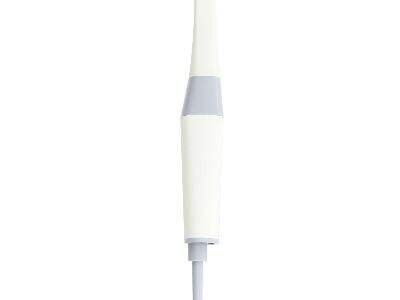Una visita al dentista implicaba impresiones pegajosas de tus dientes. Estas se utilizaban para hacer modelos de tu boca. No era necesariamente un proceso limpio o indoloro. Pero ahora, los dentistas en Dinámico tienen una manera nueva y mejor de tomar fotos de sus dientes: ¡escáneres intraorales! Este artículo discutirá las ventajas y desventajas de los escáneres intraorales en comparación con los moldes tradicionales. Al final, sabrás cuál puede ser mejor para dentistas y pacientes.
¿Qué son los escáneres intraorales?
Un escáner intraoral es una nueva herramienta que permite a los dentistas tomar una foto digital de tus dientes. Esto El escáner intraoral se hace con una pequeña varita que entra en tu boca y toma una foto de tus dientes desde diferentes ángulos. Lo genial es que estas imágenes se combinan posteriormente para formar una imagen 3D completa de tu boca. La imagen real es tridimensional, lo que proporciona al dentista una vista clara de todo lo que necesita para su trabajo.
Beneficios de los escáneres intraorales
Uno de los beneficios más importantes de usar escáneres intraorales es el confort del paciente. Esto elimina todo ese material pegajoso y desagradable que a menudo odian las personas. En su lugar, el escáner es pequeño y rápido, permitiendo a los dentistas obtener la información que necesitan con un mínimo de molestias. También eres más rápido al usar el escáner intraoral en comparación con la elaboración de moldes tradicionales. De esa manera, no tendrás que pasar tanto tiempo en la silla del dentista, ¡y eso es algo de lo que todos podemos alegrarnos!
Los inconvenientes de los escáneres intraorales
Sin embargo, también hay algunas desventajas con esta herramienta. Por un lado, pueden ser más costosos que los moldes tradicionales. No todos los dentistas tienen esta tecnología en su consultorio, lo que podría ser una barrera para algunos pacientes. En algunos casos, las imágenes del escaneo pueden no ser tan precisas o eficientes como el molde clásico. Eso significa que para algunas cosas, el método antiguo aún puede ser necesario.
Beneficios del escaneo intraoral en tiempo y costo
Desde una perspectiva de tiempo y costo, el escaneo intraoral tiene algunos beneficios obvios. Para Equipo de Tratamiento Dental moldeados más convencionales, puede tardar mucho tiempo. Los pacientes deben permanecer muy quietos con la masa en su boca durante unos minutos, lo que puede resultar incómodo y parecer eterno. En contraste, el escaneo intraoral toma una fracción del tiempo. Una de las mejores noticias sobre este tipo de escaneo es que las imágenes digitales solo toman unos minutos, y el modelo 3D se crea casi instantáneamente desde el momento en que se completa el escaneo. Esto hace que toda la visita al dentista sea mucho más fácil.
Desde la perspectiva financiera, la implementación de escáneres intraorales puede ser más costosa que las impresiones tradicionales inicialmente. Pero también pueden ahorrar dinero a largo plazo. Por ejemplo, los dentistas pueden utilizar las imágenes digitales para crear y mantener registros precisos de tus dientes. Esto reduce el "cansancio por citas" y las simulaciones pueden ayudar a los dentistas a hacerlo bien desde la primera vez, reduciendo así la necesidad de visitas y moldes posteriores en el futuro.
Precisión del Escaneo Intraoral
Otro aspecto fantástico de los escáneres intraorales es que ofrecen resultados altamente precisos. Los moldes regulares pueden verse afectados por varios factores como la saliva y el movimiento, lo que puede reducir su efectividad. Por otro lado, el escaneo intraoral es considerablemente más preciso. Estos escáneres digitales registran todos los detalles importantes de tu boca, dejando menos margen para el error. Esto es particularmente crítico para los dentistas que buscan asegurarse de que están proporcionando el mejor cuidado posible.
Sin embargo, es importante tener en cuenta que esto no se ha logrado con todos los tipos de escáneres intraorales. Algunos escáneres pueden funcionar mejor y producir imágenes más precisas que otros. Por lo tanto, antes de elegir qué escáner implementar en una práctica dental, es decir, investigar sobre esto.
Cuando Se Necesitan Viejos Moldes
Aunque es un paso significativo hacia el futuro de la odontología, a veces son necesarios los moldes tradicionales, incluso con el escaneo intraoral. Si, por ejemplo, Escáner de Placas de Fosforo un paciente tiene mucho nerviosismo al ir al dentista o tiene un fuerte reflejo de arcadas, entonces el molde pastoso puede, de hecho, ser una opción más cómoda para ellos. Algunos procedimientos dentales también pueden requerir que el molde se tome de la manera habitual para que todo esté correcto. Así, los escáneres intraorales son una gran herramienta, pero esta no es una solución única para todos.
Cosas a Tener en Cuenta
También lee: Impresiones Digitales y el Papel del Escáner Intraoral. Cómo Evaluar una Clínica Dental. Primero, considera qué tipos de terapias realiza con regularidad la clínica dental. Ten en cuenta que el escaneo intraoral puede ser más beneficioso para ciertos tratamientos que para otros.
Segundo, piensa en el precio de la tecnología y si es asequible para la clínica dental. Los escáneres intraorales pueden ser una inversión significativa, así que considera tanto las ventajas como las desventajas.
Finalmente, evalúa el confort del paciente y si el escaneo intraoral sería adecuado para los pacientes que acuden a la clínica. Mantener una sensación de comodidad al ser tratado en el dentista es crucial.
Por lo tanto, el escaneo intraoral también es algo muy importante tanto para los pacientes como para los dentistas. Y, aunque no sea la tecnología definitiva para todos los casos de uso, sin duda es una excelente herramienta para aumentar la velocidad, mejorar la precisión y mejorar la experiencia del paciente.

 EN
EN
 AR
AR NL
NL FR
FR DE
DE EL
EL HI
HI IT
IT PL
PL PT
PT RO
RO RU
RU ES
ES IW
IW ID
ID VI
VI TH
TH TR
TR FA
FA

